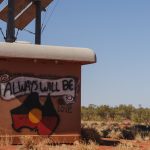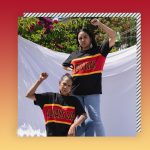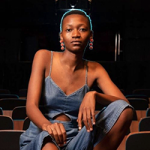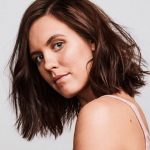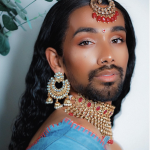In the past few years a new generation of First Nations artists have found (deserved) mainstream success and cut-through with the help of social media. Kee’ahn is one of these emerging voices, who credits Instagram as playing an important role in career.
Case in point: her lush debut single, Better Things, is one of the songs featured in Facebook and Instagram’s ‘Blak Australia’ music library. The library is just one of the initiatives the tech company has launched in partnership with NAIDOC. The initiative puts the spotlight on First Nations artists including Thelma Plum, Kobie Dee, Miiesha, Ziggy Ramo and Baker Boy.
For Kee’ahn, the path to success in music weaves together the old and the new. She harnesses the creativity of her Kuku Yalanji, Jirrbal and Zenadh Kes ancestors; live streaming in lieu of live gigs; and open authenticity to connect with her audience on social.
Read on for her stance on politics in art, coronavirus silver linings, and the power of social media for artists.
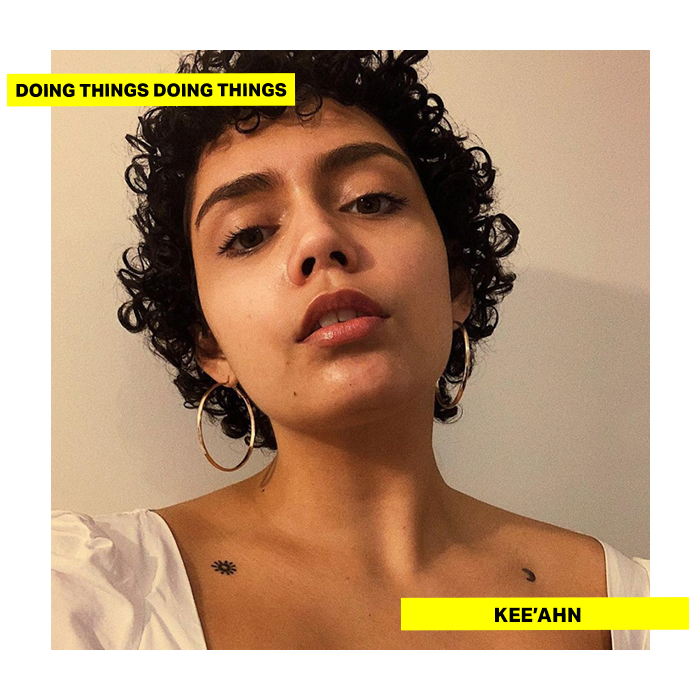
How would you describe your style and sound?
Dreamy, soulful, it’s got kind of tropical vibes. But it really speaks about identity, healing and my experience as a First Nations person. I’m influenced by a lot of the great soul singers – I have an obsession with Aretha Franklin, Sam Cooke. I really love Lianne La Havas, Moses Sumney and Joy Cooke… There’s also an Aunty from the Torres Strait who made this really great gospel soul album, and she’s influenced my music as well.
It’s clear that music and creativity have always been part of your life. But how did you go from enjoying music for yourself to actually thinking “I want this to be something more”?
I’m still realising I get to do this as a career! I think I’m just really in love with being able to sing and for people to connect to that and feel any type of way about my writing. Just the whole idea of really loving something and you get to do it as a job… I’ve never seen it as a chore, it’s only been a blessing.
I just wanted to be on stage. That’s been my obsession since I was a little kid, dancing and singing. When I dropped out of uni after trying to be a physiotherapist, I thought, ‘I want to busk! I want to do open mics, and I just want to be on stage.’ So I did musicals with my dad and choir, and performing was a big part of me feeling grounded and empowered.
Why did you drop out of uni?
It was a social anxiety thing. I had a lot of doubt, I didn’t think I could do it and studying wasn’t for me. But I felt really safe, empowered and had a lot more confidence singing. So I thought, ‘If this is what makes me feel good, maybe I should be seeking [more of] that feeling.’
Even now during COVID, my parents notice it, but when I’m feeling down I just sing or dance and I’m back to myself. It’s a core part of me. It’s connected to my name that my parents chose for me – Kee’ahn is a Wik word, from up in Cape York, which means to dance and to play. Kind of weird how it’s so ingrained in my core self.
What is your creative process like when you are making music?
It’s very fluid, I’ve realised. I’ve tried to be planned and to push it, but I kind of just have to tap into something and it just falls out. I find it easier to sing than to speak sometimes because of my social anxiety – it’s a stream of conscious style when I need to write.
But there’s also times when I’m not in the mood and I need to just figure something out to get the words to flow. I speak about it with my friend Pat, who produced the single – [in those moments] it’s like getting into ‘beast mode’. So we’ll listen to other music or make the space feel good, change the lighting or something, and try to zone in.
You released your debut single Better Things this year right at the height of the pandemic in May. Did it go down differently to what you had planned?
I just really wanted to put it out, and I was super lucky that a lot of people were supportive. My whole plan was to just throw it out and see what happened, but I had support from Homeland Collective. They support a lot of other First Nations artists that are well known and they wanted to support emerging artists. They really helped me get it out because I didn’t really know what I was doing!
But it was really necessary [to release the single] for me to feel hopeful, but it also resonated with a lot of people during this time.
Was it difficult having released music and not having the chance to play it at live gigs?
It was kind of a nice entry. It was a slow burn kind of thing, rather than me being overwhelmed so I’m almost lucky I don’t have to rush anything, and whoever wants to support me or hear will come to the gigs that come in the future. But I’m really excited to perform it [live] eventually!
Related Posts
Have there been any silver linings to releasing music during a pandemic?
During COVID everyone is online, so seeing so many different people share it… I have a new Instagram friend over in the States who shared it with Pete Wentz, the lead singer of Fallout Boy. That was so wild!
And then being asked to do performances off the back of this release, like with Delivered Live and Big Sound. I did a TikTok live recently for NAIDOC Week – and there were so many people watching, so many comments coming through learning about me, my culture and my music. So there have been lots of positives to come out of it.
It must be cool to be able to watch the videos of the streaming events afterwards. Normally you can’t watch yourself after a gig.
Definitely, prior to doing everything online I avoided looking at my performances. And when people would come up afterwards and give me feedback and say ‘Oh, I really connected with you!’ I wouldn’t really understand what they meant. So it’s been good being able to watch back and think, ‘I actually might be kind of funny and engaging!’
It’s a real positive to come out of the online streaming thing.
How crucial has social media been for your music and career?
It’s super tied to my music. Everyone really seeking connection and wanting to know the person behind the art. I really love that. It’s special that I’m able to be genuine online, and vulnerable, and people are able to connect with me and understand the further story behind the song.
I don’t even want them to see me as ‘the artist’… I kind of just see it as making friends!
For you personally, how are the arts and advocacy for social issues connected? Is music political for you, or are the two worlds separate?
Being First Nations, I am going to be politicised whether I like it or not. So for me it’s just advocating for what I feel is right, what is going to help, benefit and uplift my community. With my writing lately I’m trying to really highlight and advocate more for country, and tie it in with mental health and my identity.
I’m lucky that I can use my music and Instagram as an access point for some people [to learn more]. I really want to advocate for people to seek out diverse voices of our community so that they can learn themselves, rather than just seeking one point of reference. And advocating for the grassroots movements too.
I’m just really lucky that as a musician to get support that’s outside of my community and I just want to make sure that I’m highlighting as many voices as I can that I think are important.
Do you think that social media has been a useful tool to create change in Australia?
I think so, definitely. We saw it this year with everyone coming online at the peak of Black Lives Matter and more people sharing [what was happening]. Social media is a good tool for education and it’s really just up to the user to expand more, to learn, and ‘listen to learn’.
If there is one issue you could recommend everyone read up on right now, what would it be?
It really needs to be more localised than that. Wherever you’re living, it would be great if people were connecting with traditional owners of that country. With social media you’ll find that some of the main voices will be over on the other side of the country. They are really important and valid too, but it’s good to start local and connect with your local community as well as the bigger picture of other First Nations groups.
There is this idea that Aboriginal people and Torres Strait Island people are this monolith… but there’s over 300 different tribes and we all have different needs and different issues we’re advocating for. So it’s important to seek out what’s closest to you.

